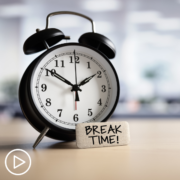Empowering CLL Patients for Treatment and Survivorship
Empowering CLL Patients for Treatment and Survivorship from Patient Empowerment Network on Vimeo.
How can chronic lymphocytic leukemia (CLL) experts help empower patients? Expert Dr. Danielle Brander explains ways that she helps her patients prepare for treatment and survivorship.
Dr. Danielle Brander is an Assistant Professor in the Division of Hematologic Malignancies & Cellular Therapy at Duke University Medical Center. Learn more about Dr. Danielle Brander.
Download Resource Guide | Descargar Guía en Español
Related Programs:

|

|

|
Transcript:
Lisa Hatfield:
“As a CLL expert, how do you help empower your patients so they can get the most out of their CLL treatment and survivorship? How do you work with them as a team to make sure, I guess they’re having the best outcome they can?”
Dr. Danielle Brander:
Absolutely. So it starts at the start. I guess so for conversations, meaning for those that don’t need treatment right away building the relationship, understanding how I can help patients and their caregivers help, for example, they like to learn how much they want to know, what resources can I connect them with. And then I think it’s important for them to have other team members that they can go to and talk to and hear it from, because sometimes the same information we can just share in different ways or approach differently. The nurse on our team or our pharmacist or I work with a wonderful group of nurse practitioners and physician assistants as well. And so from the beginning, I want patients to feel free to ask the questions that come to mind.
It’s amazing, of course, during the course of the visit when you’re going over your labs and that, that sometimes it’s easy to forget the questions you came in with. So, of course, anytime you can write them down before coming in, write them down and then maybe prioritize because all of us…I think it’s hard to remember everything. So prioritizing the questions we want to make sure we get to and go over as well as know that these same questions are going to mean different things to you the longer you’re living with your CLL. And so it’s okay to ask the same questions. Again, there’s never a question that any of us mind going over several times. And then just know how the team can help you. You know, are you coming? How much information do you want?
How much input do you want us to put? And what is your importance and priority? At the end of the day, I want all patients to know no one knows what it is, like living with it. No one knows what’s most important as much as you and your family or your caregiver team does. And I learn just as much from patients and the way they share their experiences. There’s a lot we can look at a group of patients with CLL and say how different each patient’s experiences, who needs treatment or not, who has side effects or not. But no one’s going to know as much as as you do living with it. And it’s our hope to help you wherever you are in your journey or whatever ways that we can help you.
Lisa Hatfield:
Well, and I appreciate your comment that we can ask the same questions over and over if we need to. I know my oncologist when I first met with him, I felt guilty taking in more than two questions, but right before he moved, I took in a long, I rolled up a piece of paper, a long scroll, and I said, I have some questions for you, but I knew they were all repeat questions. But it does give us a little bit of peace of mind just hearing it again from somebody, especially in those initial phases of treatment, just hearing it, even if you have to hear it again and again. So thank you for mentioning that. It makes us feel a little more confident in taking those concerns to our providers, even if they’re repeated concerns.
Lisa Hatfield:
Dr. Brander, it’s these conversations that help patients truly empower themselves along their treatment journey. And on behalf of patients like myself and those watching, thank you very much for joining us.
Dr. Danielle Brander:
Thank you for having me.
Share Your Feedback
Create your own user feedback survey










